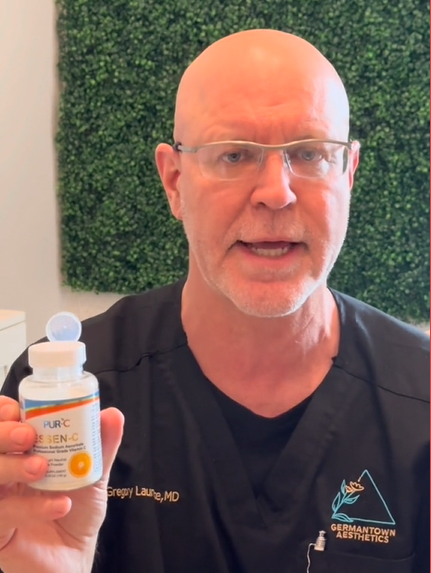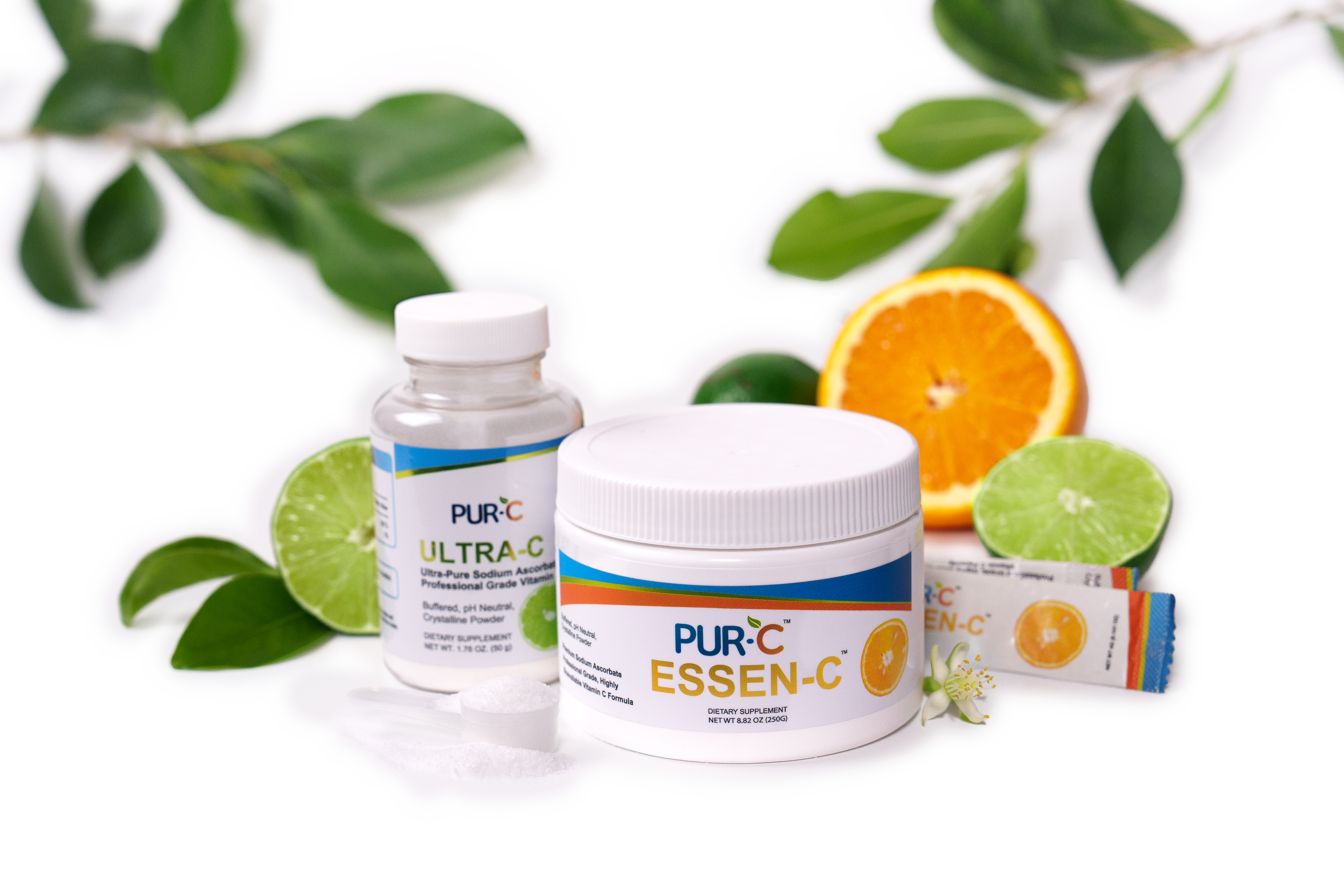
Vitamin C, also known as a score acid or ascorbate, is a cornerstone nutrient essential for human health.This professional-grade form of vitamin C is celebrated for its purity, ease of titration, absorptivity, tolerance, and adaptability to various routes of administration, making it an indispensable tool in maintaining optimal physiological levels and enhancing immune support through protocols such as SIP727™.
The daily recommended intake of vitamin C for adults ranges from 75 to 90 milligrams, with higher amounts advised for certain groups like smokers or individuals under stress. Abundant in various fruits and vegetables such as citrus fruits, strawberries, and bell peppers, vitamin C plays a crucial role in collagen synthesis. Beyond its antioxidative properties, it also demonstrates a spectrum of health benefits, including anti-parasitic, anti-viral, and anti-inflammatory effects, as well as acting as an antidepressant and analgesic. Moreover, high-dose intravenous vitamin C therapy has shown promise in targeting and eliminating cancer cells while alleviating adverse effects of chemotherapy and radiation

Sodium Ascorbate and Ascorbic Acid are both forms of Vitamin C, but they differ significantly in their chemical composition, properties, and clinical applications.
Ascorbic Acid
Ascorbic Acid is the pure, water-soluble form of Vitamin C and is classified as an organic acid due to its low pH, which makes it highly acidic. While it is effective as a Vitamin C source, its acidity can irritate the gastrointestinal tract and peripheral tissues when used in high doses. Additionally, Ascorbic Acid is less stable and more prone to oxidation, especially when exposed to air, heat, or light, which can compromise its potency over time.
Sodium Ascorbate
Sodium Ascorbate, a buffered form of Vitamin C, is created by combining Ascorbic Acid with sodium ions, resulting in a neutral pH. This buffering process significantly reduces the acidity, making it gentler on the stomach and other tissues. Its neutral pH profile provides several advantages:
Clinical Advantages of Sodium Ascorbate
Due to its gentler nature and increased stability, Sodium Ascorbate offers distinct benefits in therapeutic applications:
In summary, while both Sodium Ascorbate and Ascorbic Acid provide essential Vitamin C, Sodium Ascorbate’s superior stability, tolerability, and bioavailability make it the optimal choice for clinical and therapeutic use, particularly in settings requiring higher doses.
A Unique Sodium Profile: Distinguishing Sodium Ascorbate from Sodium Chloride
Sodium Ascorbate, a buffered form of Vitamin C, combines the ascorbate ion (the active form of Vitamin C) with a sodium ion (Na+). It is critical to differentiate the sodium in Sodium Ascorbate from sodium chloride (table salt), as their biological roles and impacts are fundamentally distinct.
The Role of Sodium Ions in Bioavailability
Sodium ions are essential cofactors for the body’s sodium-dependent Vitamin C transporters (SVCT1 and SVCT2). These specialized transporters facilitate the efficient cellular uptake of Vitamin C, enabling it to perform vital functions.
A Safe Choice for Cardiovascular Health
The sodium in Sodium Ascorbate does not include chloride ions, and therefore, it does not influence blood pressure or contribute to cardiovascular risks. Instead, it serves as a physiological cofactor that enhances Vitamin C bioavailability and cellular uptake. This distinction makes Sodium Ascorbate a safe and effective option for high-dose Vitamin C therapy, even for individuals managing cardiovascular conditions.
In summary, Sodium Ascorbate is a scientifically superior form of Vitamin C, optimized for bioavailability, tolerability, and stability. By utilizing the body’s sodium-dependent transport mechanisms, ensures efficient delivery of Vitamin C to both extracellular and intracellular spaces. This unique sodium profile, combined with its therapeutic efficacy and safety, makes Sodium Ascorbate an invaluable tool for addressing nutritional needs and supporting advanced clinical applications.

Medical-grade nutraceuticals offer distinct advantages over commercially available supplements due to their superior quality, precision, and tailored application. Here’s why choosing medical-grade supplements is crucial for achieving optimal health outcomes:
Medical-grade supplements undergo rigorous testing and adhere to stricter quality control standards compared to over-the-counter products. These standards ensure:
Medical-grade nutraceuticals are formulated with:
Unlike store-bought supplements, medical-grade nutraceuticals are often developed to address specific health concerns, such as:
Medical-grade supplements are recommended and monitored by healthcare providers who:
Patients can trust that medical-grade supplements consistently deliver the expected therapeutic outcomes due to their superior manufacturing standards and the involvement of qualified professionals in their selection and use.
Medical-grade nutraceuticals are not just supplements; they are precision tools in the management and optimization of health. Their rigorous quality control, enhanced potency, and tailored application set them apart from store-bought alternatives. By prioritizing purity and efficacy, medical-grade supplements provide the foundation for better health outcomes, making them an indispensable part of evidence-based, personalized care.

Vitamin C is important for brain health for several reasons:
Overall, vitamin C plays an important role in maintaining the health of the brain and preventing cognitive decline.
Emerging evidence highlights the significant impact of Vitamin C deficiency (hypovitaminosis C) on the nervous system and its link to a range of neurodegenerative and psychiatric disorders. As a potent antioxidant and cofactor in critical biochemical processes, Vitamin C plays a pivotal role in maintaining brain health and modulating the progression of neurological conditions.
Vitamin C is one of the most concentrated antioxidants in the brain, essential for combating oxidative stress—an imbalance between reactive oxygen species (ROS) production and the body’s antioxidant defenses. Oxidative stress is a hallmark of neurodegenerative diseases, including:
In addition, Vitamin C’s antioxidant properties protect against neuronal damage and support the maintenance of cellular integrity in the central nervous system (CNS).
Vitamin C is a cofactor in synthesizing key neurotransmitters such as dopamine, norepinephrine, and serotonin. A deficiency in Vitamin C disrupts neurotransmitter production, impairing brain function and contributing to conditions like:
Furthermore, Vitamin C modulates neurotransmission, promotes neuronal maturation and differentiation, and supports myelin formation—essential for proper nerve conduction.
Recent studies demonstrate Vitamin C’s antinociceptive effects, reducing pain by blocking nociceptive signaling. This has shown promise in managing acute pain, complex regional pain syndrome (CRPS), and seizure-induced damage. Clinical evidence also highlights Vitamin C’s ability to reduce seizure severity and prevent neurotoxicity from harmful substances such as aluminum or colchicine.
Targeted deletion of the sodium-dependent Vitamin C co-transporter (SVCT2) in animal models leads to widespread cerebral hemorrhage and neonatal death, underscoring the indispensability of Vitamin C for CNS function. It supports critical processes such as:
Vitamin C deficiency has been implicated in brain damage in premature infants, memory impairments, and neuropathological alterations. Its therapeutic potential in mitigating neurodegeneration and supporting recovery from neurotoxic insults is an area of growing clinical interest.
Vitamin C plays a pleiotropic role in the nervous system, extending beyond its antioxidant capabilities. Its involvement in collagen synthesis, carnitine production, tyrosine metabolism, and peptide hormone biosynthesis underscores its systemic importance. With the highest concentrations found in the brain and neuroendocrine tissues, Vitamin C is uniquely positioned to influence the course of neurological diseases and provide therapeutic benefits.
In summary, Vitamin C is indispensable for nervous system health, with broad applications in preventing and managing neurodegenerative and psychiatric disorders. From supporting antioxidant defense to facilitating neurotransmission and neuronal repair, Vitamin C is a cornerstone of CNS function. Ensuring adequate intake, whether through diet or supplementation, may provide significant neuroprotective benefits and improve outcomes for individuals with neurological conditions.
Vitamin C has been used in the treatment of drug and alcohol addiction and recovery for several decades. Vitamin C is an antioxidant, and it plays a crucial role in the body’s detoxification processes. It has been suggested that Vitamin C supplementation may help reduce the severity of withdrawal symptoms and support recovery from addiction.
Drug and alcohol addiction can cause oxidative stress in the body, which can damage cells and contribute to the development of chronic health problems. Vitamin C can neutralize free radicals and other reactive molecules, reducing oxidative stress and protecting cells from damage.
Furthermore, drug and alcohol addiction can deplete the body’s stores of Vitamin C, as substances such as alcohol can interfere with the absorption and utilization of this nutrient. Supplementing with Vitamin C can help restore these levels and support overall health.
There is also some evidence to suggest that Vitamin C may have a role in reducing cravings for drugs and alcohol. One study found that high-dose Vitamin C supplementation reduced the desire to smoke in a group of smokers. Another study found that Vitamin C supplementation reduced alcohol cravings in individuals with alcohol dependence.
Overall, while the evidence on the effectiveness of Vitamin C in addiction treatment is still limited, it may have potential benefits as a supplement to support recovery. It’s worth noting that Vitamin C should not be used as a substitute for evidence-based addiction treatment, but rather as a complementary therapy alongside other interventions.
Vitamin C presents a compelling adjunctive strategy in addressing opioid dependency, particularly when integrated into a comprehensive recovery plan. Individuals struggling with addiction often experience a significant toxic burden, elevated oxidative stress, and depleted Vitamin C levels due to excessive production of reactive oxygen species (ROS). This heightened metabolic demand necessitates continuous, high-dose oral Vitamin C supplementation to restore physiological balance and support the body’s recovery processes.
Vitamin C’s potent antioxidant properties play a crucial role in mitigating oxidative stress, which is a hallmark of opioid use and withdrawal. By neutralizing ROS and reducing inflammation, Vitamin C protects neuronal integrity and supports the repair of damaged tissues in the brain and body. These benefits extend beyond cellular protection, as Vitamin C also enhances neurotransmitter synthesis, including serotonin and dopamine, which are often dysregulated in addiction. This contributes to mood stabilization and reduces the psychological challenges associated with recovery.
High-dose oral Vitamin C is particularly suited for individuals dealing with addiction, as it ensures sustained systemic availability, addressing both extracellular and intracellular requirements. Maintaining optimal plasma levels of Vitamin C is essential to counteract the chronic inflammation and immune suppression commonly seen in opioid users. Additionally, continuous supplementation helps improve resilience and promotes detoxification by neutralizing the toxic metabolites of opioids and other substances.
For patients in recovery, Vitamin C’s role extends to pain management and reducing opioid reliance. Chronic pain, a frequent trigger for opioid dependency, may be alleviated through Vitamin C’s support in collagen synthesis and tissue repair. These functions contribute to musculoskeletal health and reduce the need for opioids in pain management protocols.
While Vitamin C is not a standalone treatment, its integration into evidence-based therapies—such as counseling, behavioral interventions, and medically assisted detoxification—can significantly enhance outcomes. Continuous, high-dose oral supplementation ensures that the body’s heightened metabolic demands are met, improving withdrawal symptom management and overall recovery trajectories. This approach underscores Vitamin C’s indispensable role in supporting individuals on their path to overcoming opioid dependency, providing both physiological and psychological benefits critical to long-term success.
Vitamin C plays a crucial role in immune function and can help the body fight off viral and bacterial infections in several ways:
Vitamin C has emerged as a critical ally in the fight against COVID-19 and its long-term repercussions, offering benefits that extend from managing acute respiratory infections to addressing post-viral syndromes such as Long COVID and vaccine-related injuries. Its versatility stems from its powerful antioxidant properties, immune-modulating effects, and essential role in tissue repair, making it a cornerstone of integrative therapeutic strategies.
During acute COVID-19, the body faces overwhelming oxidative stress and inflammation, driven by the SARS-CoV-2 virus. High-dose Vitamin C (HDVCT) addresses these challenges by neutralizing reactive oxygen species (ROS) and mitigating the hyperinflammatory cytokine storm, a hallmark of severe cases. This modulation of inflammatory processes not only protects vital organs, such as the lungs but also enhances the immune system’s ability to target the virus effectively.
Moreover, high-dose Vitamin C has been shown to improve respiratory function in patients with severe COVID-19. By supporting endothelial health and reducing oxidative damage, it helps maintain oxygenation and lung capacity, often reducing the need for mechanical ventilation. Clinical studies have consistently demonstrated the role of Vitamin C in lowering inflammatory markers such as interleukin-6 (IL-6) and C-reactive protein (CRP), markers strongly associated with severe disease outcomes.
The importance of Vitamin C therapy extends beyond the acute phase of COVID-19. Many individuals recovering from the virus or dealing with vaccine-associated injuries experience prolonged symptoms, including chronic fatigue, brain fog, muscle weakness, and systemic inflammation. Known collectively as Long COVID, these conditions often result from unresolved oxidative stress, mitochondrial dysfunction, and immune dysregulation.
Vitamin C’s role in restoring mitochondrial function is particularly significant for addressing these symptoms. By supporting the electron transport chain and reducing ROS, Vitamin C enhances cellular energy production, alleviating fatigue and promoting recovery. Its anti-inflammatory properties help resolve lingering inflammation, which is often implicated in symptoms like brain fog and joint pain.
In the context of vaccine-related injuries, Vitamin C offers further benefits by addressing endothelial damage and microvascular dysfunction, both of which have been reported in some cases following mRNA vaccination. Its ability to promote collagen synthesis and vascular repair supports the recovery of damaged tissues, while its antioxidant effects protect against further oxidative injury.
An integrated approach combining intravenous Vitamin C (IVC) and high-dose oral supplementation is essential for achieving the best outcomes. While IVC delivers the pharmacological concentrations required to address acute oxidative stress and inflammation, oral Vitamin C ensures sustained physiological levels, supporting immune function and long-term recovery. This dual strategy is particularly important for critically ill patients or those with significant metabolic demand, where baseline Vitamin C levels are often severely depleted.
Vitamin C is not a standalone cure for COVID-19 or vaccine-related injuries, but its inclusion as part of a comprehensive treatment strategy is invaluable. Its ability to modulate immune responses, neutralize oxidative stress, and promote tissue repair makes it a critical component in managing the acute and chronic impacts of SARS-CoV-2 and related challenges.
By addressing both immediate and long-term health needs, Vitamin C therapy provides a safe and effective tool for clinicians, helping patients recover from the complex effects of COVID-19 and its associated complications.
Optimal levels of ascorbate are essential for proper dental and skeletal development, starting as early as embryonic formation. During pregnancy and lactation, adequate Vitamin C intake is critical for the formation of teeth and bones in the fetus. Suboptimal ascorbate levels during these stages can result in developmental abnormalities in enamel and dentin, leading to an increased risk of caries and oral infections in infants and children. Ensuring sufficient Vitamin C intake during these critical periods not only supports the mother’s health but also secures the foundation for her child’s long-term dental and skeletal health.
Sodium ascorbate has become an invaluable adjunct in managing dental wounds, particularly in postoperative scenarios such as extractions, bone grafts, implants, cavitation surgeries, and other maxillofacial procedures. Its unique combination of antimicrobial, anti-inflammatory, antioxidant, and collagen-synthesizing properties makes it a cornerstone for optimizing recovery and reducing complications.
Postoperative infections can jeopardize healing and lead to significant complications. Sodium ascorbate’s antimicrobial activity inhibits the growth of oral pathogens, including bacteria implicated in dental infections. By neutralizing bacterial toxins and reducing microbial burden, sodium ascorbate protects surgical sites from contamination, minimizing tissue damage and enhancing healing outcomes.
Sodium ascorbate’s anti-inflammatory properties are critical for mitigating postoperative inflammation, which can impede recovery and exacerbate pain. By reducing swelling and modulating the inflammatory response, it creates an environment conducive to tissue repair and accelerates healing, improving both short-term and long-term outcomes.
Collagen synthesis is vital for the repair of oral tissues, including soft tissues, periodontal structures, and bone. Sodium ascorbate facilitates the hydroxylation of proline and lysine residues, essential steps in forming stable and functional collagen. This capability is particularly important in procedures requiring robust tissue regeneration, such as implant placement or bone grafting.
Post-surgical oxidative stress, caused by reactive oxygen species (ROS) generated during tissue trauma, can delay healing and heighten the risk of complications. Sodium ascorbate acts as a potent antioxidant, neutralizing ROS and protecting cellular integrity. By stabilizing the redox balance, it promotes optimal recovery conditions and shields tissues from further oxidative damage.
Pain management is a crucial component of postoperative care. Sodium ascorbate has demonstrated antinociceptive properties, reducing the perception of pain by modulating neural pathways. Its ability to alleviate inflammation and promote tissue repair further enhances patient comfort during recovery.
Sodium ascorbate can be seamlessly integrated into postoperative dental protocols:
Beyond postoperative care, sodium ascorbate plays a crucial role in maintaining daily oral health. Incorporating it into oral hygiene routines provides antimicrobial, anti-inflammatory, and regenerative benefits, preventing common dental issues such as caries, gingivitis, and periodontal disease.
Regular use of sodium ascorbate in oral care routines is especially beneficial following dental surgeries. Its ability to enhance collagen production, reduce microbial burden, and mitigate inflammation ensures faster recovery and improved clinical outcomes. Patients can expect accelerated tissue repair, reduced pain, and lower risks of secondary infections.
Sodium ascorbate’s pH-neutral properties make it ideal and safe for daily oral care, unlike ascorbic acid (AA), which is highly acidic and can cause permanent damage to tooth enamel. The acidity of AA contributes to enamel erosion, increasing the risk of tooth sensitivity, cavities, and long-term dental issues. Additionally, AA can irritate gums and oral tissues, exacerbating pre-existing conditions. For these reasons, AA should never be used for oral care applications.
Similarly, other Vitamin C formulations that may contain additives, flavorings, or fillers are not recommended for therapeutic or oral hygiene purposes, as they may introduce irritants or reduce efficacy. To achieve optimal benefits and therapeutic outcomes, only pure, medical-grade Sodium Ascorbate (SA) should be used. Its safety, tolerability, and effectiveness make it the superior choice for oral care, particularly for individuals with sensitive teeth or oral conditions. However, it is important to note that Sodium Ascorbate should complement, not replace, professional dental care such as regular cleanings and check-ups.
Sodium ascorbate stands as a pivotal agent in both routine dental care and postoperative wound management. From supporting embryonic tooth development to enhancing tissue regeneration in complex dental surgeries, it offers unparalleled benefits for oral health. Its incorporation into daily oral hygiene routines ensures long-term dental wellness while complementing professional dental interventions.
Vitamin C has emerged as a pivotal adjunct in cancer therapy, leveraging its unique pro-oxidant activity at high concentrations to selectively target cancer cells. When combined with complementary therapies and integrated into a dual strategy of intravenous (IVC) and oral supplementation, Vitamin C offers a comprehensive approach to cancer care.
At pharmacological doses, typically administered via IVC, Vitamin C generates hydrogen peroxide (H₂O₂) within the tumor microenvironment, selectively targeting cancer cells while sparing healthy tissues.
High-dose Vitamin C therapy (HDVCT) enhances the efficacy of various natural and integrative therapies, creating synergistic effects that optimize cancer treatment outcomes:
A combined approach of IVC and high-dose oral Vitamin C maximizes therapeutic efficacy:
Vitamin C strengthens the immune system through multiple mechanisms:
Integrating HDVCT into cancer protocols requires professional oversight and individualized approaches:
High-dose Vitamin C therapy (HDVCT) represents a transformative approach in integrative oncology. Its pro-oxidant properties, ability to synergize with complementary therapies, and dual strategy of IVC and oral supplementation provide a powerful framework for targeted cancer care. By supporting immune function, enhancing redox balance, and prioritizing patient quality of life, HDVCT establishes itself as an indispensable component in modern, holistic cancer treatment.
